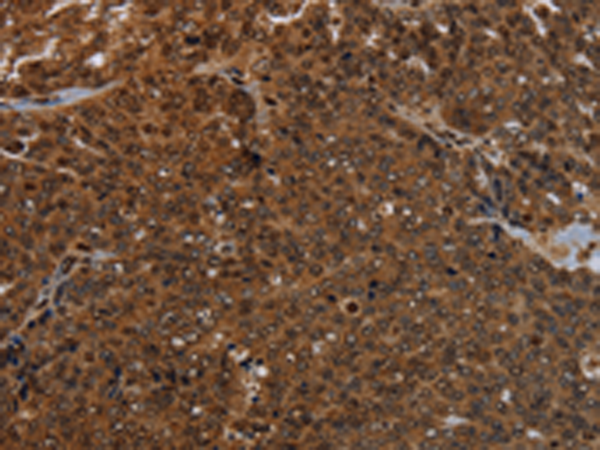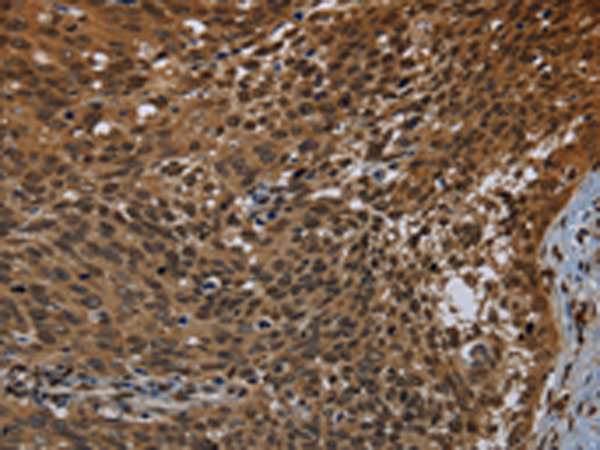

| WB | 咨询技术 | Human,Mouse,Rat |
| IF | 咨询技术 | Human,Mouse,Rat |
| IHC | 1/50-1/200 | Human,Mouse,Rat |
| ICC | 技术咨询 | Human,Mouse,Rat |
| FCM | 咨询技术 | Human,Mouse,Rat |
| Elisa | 1/2000-1/5000 | Human,Mouse,Rat |
| Aliases | JMJD2B; TDRD14B |
| Host/Isotype | Rabbit IgG |
| Antibody Type | Primary antibody |
| Storage | Store at 4°C short term. Aliquot and store at -20°C long term. Avoid freeze/thaw cycles. |
| Species Reactivity | Human |
| Immunogen | Synthetic peptide of human KDM4B |
| Formulation | Purified antibody in PBS with 0.05% sodium azide and 50% glycerol. |
+ +
以下是关于KDM4B抗体的3篇参考文献的简要信息:
---
1. **文献名称**:*KDM4B promotes genomic instability through regulation of histone methylation during DNA replication*
**作者**:Liu G, et al.
**摘要**:研究揭示了KDM4B通过调控组蛋白去甲基化影响DNA复制过程中的基因组稳定性。作者使用KDM4B抗体进行ChIP-seq和免疫印迹实验,证明其在复制压力下异常表达会诱导DNA损伤,并与癌症发展相关。
---
2. **文献名称**:*Targeting KDM4B inhibits prostate cancer metastasis and androgen receptor signaling*
**作者**:Wu Y, et al.
**摘要**:该研究开发了针对KDM4B的小分子抑制剂,并利用KDM4B抗体验证其蛋白表达水平。结果显示,抑制KDM4B可降低前列腺癌转移能力,并阻断雄激素受体信号通路,为治疗提供了新靶点。
---
3. **文献名称**:*KDM4B interacts with HSF1 to drive a transcriptional program supporting tumorigenesis*
**作者**:Wang L, et al.
**摘要**:通过免疫共沉淀(Co-IP)和免疫荧光实验(使用KDM4B特异性抗体),作者发现KDM4B与热休克因子HSF1相互作用,共同调控促癌基因表达,促进肿瘤细胞增殖和耐热应激能力。
---
如果需要更多文献或具体DOI信息,可进一步提供研究方向关键词。
The KDM4B antibody is a crucial tool for studying the lysine-specific demethylase 4B (KDM4B/JMJD2B), an enzyme belonging to the Jumonji C (JmjC) domain-containing histone demethylase family. KDM4B specifically catalyzes the removal of methyl groups from histone H3 lysine 9 (H3K9me3/me2) and lysine 36 (H3K36me3/me2), modulating chromatin structure and gene expression. It plays pivotal roles in epigenetic regulation, influencing processes like DNA replication, repair, stem cell maintenance, and cellular differentiation. Dysregulation of KDM4B is linked to cancer progression, as it is frequently overexpressed in tumors (e.g., breast, prostate, and colorectal cancers), promoting oncogenesis by activating oncogenic pathways, suppressing tumor suppressors, and enhancing genomic instability.
The KDM4B antibody is widely used in research to detect protein expression, localization, and functional interactions via techniques such as Western blotting, immunohistochemistry, and chromatin immunoprecipitation (ChIP). It aids in exploring KDM4B's role in disease mechanisms and therapeutic targeting. Commercial KDM4B antibodies are typically developed in rabbit or mouse hosts, targeting specific epitopes or functional domains (e.g., the catalytic JmjC domain). Validation for specificity and sensitivity is critical, as off-target binding to homologous family members (e.g., KDM4A/C/D) can occur. Researchers rely on this antibody to dissect KDM4B's contributions to epigenetic dysregulation and its potential as a biomarker or drug target in cancer and other diseases.
×